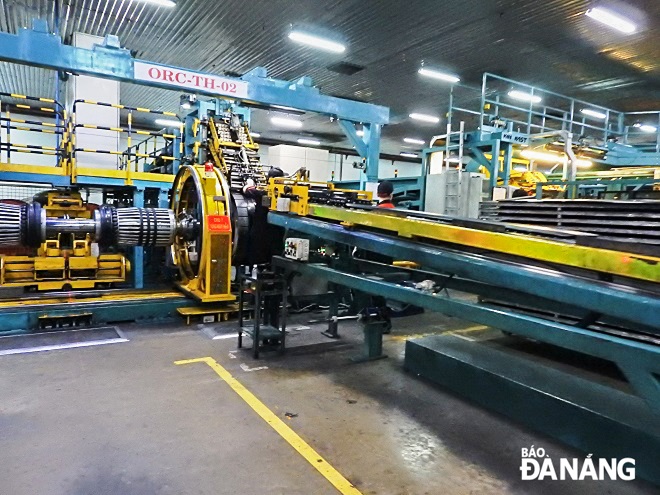Resource mobilisation for Da Nang's manufacturing and processing industry
The manufacturing and processing industry is one of Da Nang’s tier-1 economic sectors with the largest value-added scale. It is also the key economic sector of the city’s Industry - Construction sector as accounting for more than 62% of the region's total value added.
 |
| Production of high quality car tires at the Da Nang Rubber JSC |
Therefore, the change in labour productivity of the manufacturing and processing industry will have a significant impact on the labour productivity of the whole economy in general, and the industry - construction sector in particular.
Notably, the manufacturing and processing industry has recently recorded a low -ranking position in terms of labour productivity. In 2019, the industry ranked 11th out of 20 tier-1 industries in terms of the labour productivity, and at the same time is also one of the two tier-1 industries with the lowest labour productivity in the Industry - Construction sector, just behind the Construction industry.
In addition, labour productivity growth of the manufacturing and processing industry significantly slowed down during the 2015-2019 period compared to the previous period and reached a very low level compared to many other industries in the same economic sector. All aforementioned things show the need for the city to focus resources for improving labour productivity of the manufacturing and processing industry in a bid to enhance labour productivity of the whole region.
Recent research conducted by the Da Nang Institute for Socio-Economic Development, the policy of retraining workers and the ability to access bank loans are the two main factors that have the greatest impact on the ability to improve labor productivity of manufacturing and processing enterprises in Da Nang. Therefore, the city needs to have suitable policies to encourage businesses in this industry to focus on retraining workers, as well as to support them to access capital.
Currently, the central and municipal governments have issued many policies to support businesses in accessing loans. However, in reality, few manufacturing and processing enterprises have access to or care about these policies for many reasons. Therefore, in order to support capital or encourage training activities to improve labour productivity of the manufacturing and processing industry, instead of developing new policies, Da Nang - first of all - needs to have solutions to enhance access to existing policies for businesses and through this process to make policy adjustments to better suit the actual situation.
Besides, instead of encouraging enterprises in general to apply the quality management systems to improve labour productivity, the city will pay special attention to supporting enterprises to access or expand the market. This is explained by the fact that most small and medium-sized enterprises today have little interest in applying quality management systems. Meanwhile, the new market size is the leading and motivating factor for enterprises to apply the quality management systems, hereby improving labour productivity and production efficiency.
Most of the manufacturing and processing enterprises based in Da Nang are implementing export activities or export processing on the basis of making the most of cheap labour. However, the direct source of labour is becoming difficult to attract and unstable in Da Nang due to its low income and is under pressure from rising housing costs.
In fact, the Vietnamese government is maintaining a minimum wage that is not only low but also tends to grow very slowly to create an advantage to attract FDI investors. This has been creating a paradox for the improvement of labour productivity in labour intensive industries such as manufacturing industry.
It is an urgent for Da Nang to solve the abovementioned problems in order to support manufacturing and processing enterprises in the city to stabilise production and increase labour productivity, hereby contributing to improving labour productivity of the city's general society and economic restructuring in accordance with the set orientation.
Reporting by THIEN NGA - Translating by M.DUNG